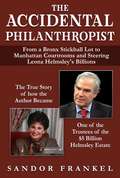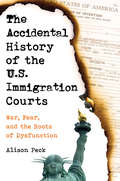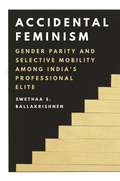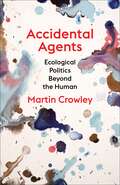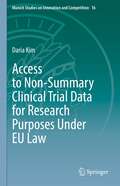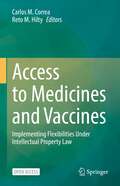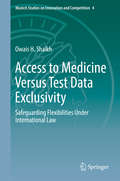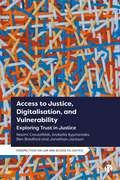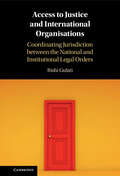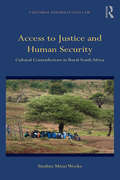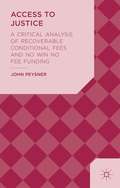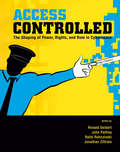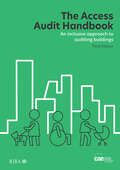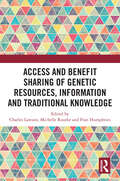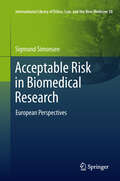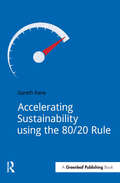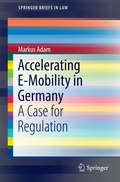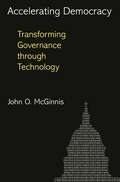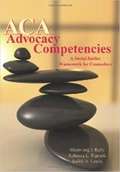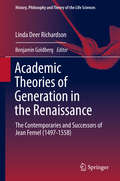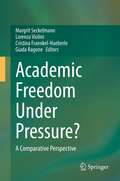- Table View
- List View
Accidents of Providence: A Novel
by Stacia M. Brown&“A seventeenth-century heroine for our times&” could face death for her dangerous affair with an English revolutionary (O, The Oprah Magazine). London, 1649. King Charles has been beheaded for treason; Cromwell is in power; paranoia and self-righteousness rule; and glove maker Rachel Lockyer has been engaged in a secret affair with William Walwyn, a Leveler who advocates for independence and tolerance. But when Rachel&’s &“bastard&” infant is found hidden in the woods, Rachel is arrested. No one disputes that the young mother buried her beloved daughter. The question that has brought Rachel to trial for murder is: why? Now drawn into Rachel&’s circle is the married lover she is loathe to reveal; a fiercely compassionate mother who lost her own children to smallpox; a prosecutor hell-bent on making an example of Rachel; and the criminal investigator, increasingly reluctant to build his case against the condemned young woman—all of them brought to reckon for this one life. At once a remarkable love story and a breathtaking thriller based on true events, Accidents of Providence is &“heart-poundingly vivid [and] intellectually provocative . . . historical fiction at its best&” (Kirkus Reviews, starred review). &“[A] delightfully seditious heroine . . . Proof that a historical novel can be educational and entertaining.&” —O, The Oprah Magazine &“Wonderfully detailed and keenly researched, it is a moving portrait of a courageous woman caught between a disastrous affair with a charismatic revolutionary and the draconian laws of the land that would put her to death because of it.&” —Kathleen Kent, author of The Traitor&’s Wife
The Accidental Philanthropist: From A Bronx Stickball Lot to Manhattan Courtrooms and Steering Leona Helmsley's Billions
by Sandor FrankelThe True Story of an Extraordinary Journey from the Bronx to the Helm of the $5 Billion Helmsley Charitable Trust, Doling Out Unimaginable Amounts of Money for the Good of the World. The Author met his client in the prison&’s visitors&’ room: he, the lawyer, and she, his client, now being patted down by a guard following the first night of a four-year sentence. Identified here by an inmate number, she was known worldwide: the notorious Leona Helmsley, owner of a gargantuan real estate portfolio; the woman who had reputedly scoffed &“Only the little people pay taxes"; the &“queen of mean&” whom Newsweek described as &“rhymes with rich.&” Wolfing down popcorn the author bought her from the prison vending machine, she was one of the most maligned people on the planet. What he saw, though, was a frightened 71-year-old inmate, alone and in need of something altogether absent from her life: someone she could trust. In her eyes, he was perhaps the closest thing. Two years earlier, he had joined her legal team following her conviction for tax crimes. Just two days before, in her sumptuous Manhattan penthouse, she ferociously fired one lawyer while the others quit. He was the last man standing. In time, he became not just her go-to lawyer but her consigliere. He now had to deal with the countless people trying to dip a pinky or a shovel into her fortune. She also presented him with a host of personal issues. Ultimately, she named him as one of her executors, charged with overseeing and liquidating her multi-billion dollar estate, and also one of the trustees of a charitable trust she would fund &“to improve lives…around the world.&” That is how, on Leona Helmsley&’s death in 2007, the author became a steward of her $5 billion fortune, which he and his co-trustees were duty-bound to give away to causes and recipients they alone would determine. Little in his life had prepared him for such a role. He grew up in a lower middle-class section of the Bronx, wound up at Harvard Law School, and built a successful career as a trial lawyer, representing some of the rich and famous and some ordinary folks. But overseeing perhaps the largest private real estate empire in the country, selling all those properties and the assorted bonds, diamonds, and other playthings of the rich, and choosing the goals of a vast charitable trust funded with those sales&’ proceeds, was something else altogether. He tasted the nectar of instant popularity, and became incontrovertible proof that when you control billions of dollars, you become wittier, funnier, far more profound than you&’ve ever been, and always worth listening to. Friends, pseudo-friends, former friends, would-be friends, quasi friends, friends of friends—everyone comes knocking. The Accidental Philanthropist tells how all this happened.
The Accidental History of the U.S. Immigration Courts: War, Fear, and the Roots of Dysfunction
by Alison PeckHow the immigration courts became part of the nation’s law enforcement agency—and how to reshape them. During the Trump administration, the immigration courts were decried as more politicized enforcement weapon than impartial tribunal. Yet few people are aware of a fundamental flaw in the system that has long pre-dated that administration: The immigration courts are not really "courts" at all but an office of the Department of Justice—the nation’s law enforcement agency. This original and surprising diagnosis shows how paranoia sparked by World War II and the War on Terror drove the structure of the immigration courts. Focusing on previously unstudied decisions in the Roosevelt and Bush administrations, the narrative laid out in this book divulges both the human tragedy of our current immigration court system and the human crises that led to its creation. Moving the reader from understanding to action, Alison Peck offers a lens through which to evaluate contemporary bills and proposals to reform our immigration court system. Peck provides an accessible legal analysis of recent events to make the case for independent immigration courts, proposing that the courts be moved into an independent, Article I court system. As long as the immigration courts remain under the authority of the attorney general, the administration of immigration justice will remain a game of political football—with people’s very lives on the line.
Accidental Feminism: Gender Parity and Selective Mobility among India’s Professional Elite
by Swethaa S. BallakrishnenExploring the unintentional production of seemingly feminist outcomes In India, elite law firms offer a surprising oasis for women within a hostile, predominantly male industry. Less than 10 percent of the country’s lawyers are female, but women in the most prestigious firms are significantly represented both at entry and partnership. Elite workspaces are notorious for being unfriendly to new actors, so what allows for aberration in certain workspaces?Drawing from observations and interviews with more than 130 elite professionals, Accidental Feminism examines how a range of underlying mechanisms—gendered socialization and essentialism, family structures and dynamics, and firm and regulatory histories—afford certain professionals egalitarian outcomes that are not available to their local and global peers. Juxtaposing findings on the legal profession with those on elite consulting firms, Swethaa Ballakrishnen reveals that parity arises not from a commitment to create feminist organizations, but from structural factors that incidentally come together to do gender differently. Simultaneously, their research offers notes of caution: while conditional convergence may create equality in ways that more targeted endeavors fail to achieve, “accidental” developments are hard to replicate, and are, in this case, buttressed by embedded inequalities. Ballakrishnen examines whether gender parity produced without institutional sanction should still be considered feminist.In offering new ways to think about equality movements and outcomes, Accidental Feminism forces readers to critically consider the work of intention in progress narratives.
Accidental Agents: Ecological Politics Beyond the Human (Insurrections: Critical Studies in Religion, Politics, and Culture)
by Martin CrowleyIn the Anthropocene, the fact that human activity is enmeshed with the existence and actions of every kind of other being is inescapable. As a result, the planetary ecological crisis has brought forth an urgent need to rethink understandings of human action. One response holds that the transformations necessary to tackle today’s crises will emerge from the distinctive capacity of human beings to transcend their environment. Another school of thought calls for seeing action as composite, produced by distributed networks of human and nonhuman agents. Yet the first of these is open to charges of human exceptionalism, while the second, according to its critics, lacks effective political traction.Martin Crowley argues that a new conception of political agency is necessary to break this impasse. Engaging with thinkers such as Bruno Latour, Bernard Stiegler, and Catherine Malabou, Crowley proposes an original account of agency as both distributed and decisive. Challenging the prevailing view of agency as exclusively human, he explores how a politics that incorporates nonhuman agency can intervene in the real world, examining timely issues such as climate-related migration and digital-algorithmic politics. A major intervention into ongoing debates in posthumanism, political ecology, and political theory, Accidental Agents reshapes our understanding of political agency in and for a more-than-human world.
Accessories in Private Law
by Dietrich, Joachim and Ridge, Pauline Joachim Dietrich Pauline RidgeAccessory liability is an often neglected but very important topic across all areas of private law. By providing a principled analytical framework for the law of accessories and identifying common themes and problems that arise in the law, this book provides much-needed clarity. It explains the fundamental concepts that are used to impose liability on accessories, particularly the conduct and mental elements of liability: 'involvement' in the primary wrong and (generally) knowledge. It also sets out in detail the specific rules and principles of liability as these operate in different areas of common law, equity and statute. A comparative study across common law and criminal law jurisdictions, including the United States, also sheds new light on what is and what is not accessory liability.
Access to Non-Summary Clinical Trial Data for Research Purposes Under EU Law (Munich Studies on Innovation and Competition #16)
by Daria KimThis book draws a unique perspective on the regulation of access to clinical trial data as a case on research and knowledge externalities. Notwithstanding numerous potential benefits for medical research and public health, many jurisdictions have struggled to ensure access to clinical trial data, even at the level of the trial results. Pro-access policy initiatives have been strongly opposed by research-based drug companies arguing that mandatory data disclosure impedes their innovation incentives. Conventionally, access to test data has been approached from the perspective of transparency and research ethics. The book offers a complementary view and considers access to individual patient-level trial data for exploratory analysis as a matter of research and innovation policy. Such approach appears to be especially relevant in the data-driven economy where digital data constitutes a valuable economic resource. The study seeks to define how the rules of access to clinical trial data should be designed to reconcile the policy objectives of leveraging the research potential of data through secondary analysis, on the one hand, and protecting economic incentives of research-based drug companies, on the other hand. Overall, it is argued that the mainstream innovation-based justification for exclusive control over the outcomes of research and development can hardly rationalise trial sponsors’ control over primary data from trials. Instead, access to such data and its robust analysis should be prioritised.
Access to Medicines as a Human Right
by Jillian Clare Kohler Lisa FormanAccording to the World Health Organization, one-third of the global population lacks access to essential medicines. Should pharmaceutical companies be ethically or legally responsible for providing affordable medicines for these people, even though they live outside of profitable markets? Can the private sector be held accountable for protecting human beings' right to health?This thought-provoking interdisciplinary collection grapples with corporate responsibility for the provision of medicines in low- and middle-income countries. The book begins with an examination of human rights, norms, and ethics in relation to the private sector, moving to consider the tensions between pharmaceutical companies' social and business duties. Broad examinations of global conditions are complemented by case studies illustrating different approaches for addressing corporate conduct. Access to Medicines as a Human Right identifies innovative solutions applicable in both global and domestic forums, making it a valuable resource for the vast field of scholars, legal practitioners, and policymakers who must confront this challenging issue.
Access to Medicines and Vaccines: Implementing Flexibilities Under Intellectual Property Law
by Carlos M. Correa Reto M. HiltyThis open access book is the outcome of a Global Forum on Innovation, Intellectual Property and Access to Medicines held in December 2019 at the Max Plank Instititute in Munich, organised by the South Centre and the Max Plank Institute. The academics and experts from international organisations participating have contributed chapters to this book. The book is for policy makers (in Ministries of Health, Ministries of Trade, Ministries of Foreign Affairs, patent offices), but also relevant for academics (law, trade, public health), on the flexibilities available in the Agreement on Trade Related Aspects of Intellectual Property Rights (TRIPS) of the World Trade Organization to promote access to medicines.
Access to Medicine Versus Test Data Exclusivity: Safeguarding Flexibilities Under International Law (Munich Studies on Innovation and Competition #4)
by Owais H. ShaikhThis book explores the concept of test data exclusivity protection for pharmaceuticals. Focusing on Art 39(3) of the WTO Agreement on Trade-Related Aspects of Intellectual Property Rights (TRIPS Agreement) and relevant provisions in selected free trade agreements (FTA) and national laws, it combines normative, historical, comparative and economic analysis of test data exclusivity protection. At the heart of this book is the novel and original Index of Data Exclusivity and Access (IDEAS), which analyzes the effectiveness of test data exclusivity provisions in FTAs and national laws both on the strength of exclusivity as well as on access to medicine. IDEAS provides a framework for the assessment of current test data exclusivity protection standards on the basis of their proximity to Article 39(3) of the TRIPS Agreement, the scope of exclusivity and the flexibilities in FTAs, and subsequently in national laws. This book aims to broaden national and international policy makers' grasp of the various nuances of test data exclusivity protection. Furthermore, it provides practical recommendations with regard to designing an appropriate legal system with a strong focus on promoting access to medicine for all.
Access to Justice in Iran
by Sahar MaranlouThis book offers a critical and in-depth analysis of access to justice from international and Islamic perspectives. Existing Western models have highlighted the mechanisms by which individuals can access justice; however, access to justice incorporates various conceptions of justice and of the users of justice. This book evaluates the historical development of the justice sector in Iran and discusses various issues, such as the performance of the justice sector, judicial independence, efficiency and accessibility, normative protection, together with an analysis of barriers. It explores the legal empowerment of users, with a specific focus on women, and presents the findings of a survey study on the perceptions of Iranian women. This study is designed to focus on women's basic legal knowledge, their familiarity with legal procedure, their perceptions of cultural barriers, the issues that influence their preference for mechanisms of formal or alternative dispute solutions, and their level of satisfaction with their chosen courses of action.
Access to Justice, Digitalization and Vulnerability: Exploring Trust in Justice
by Naomi Creutzfeldt Arabella Kyprianides Ben Bradford Jonathan JacksonThe pandemic has significantly impacted people's engagement with the administrative justice system (AJS). As we navigate the post-pandemic era, the siloed landscape of tribunals, ombuds, advice services and NGOs face the challenge of maintaining trust in the justice system's fairness, efficacy and inclusivity. Examining the journeys individuals undertake to seek justice in housing and special educational needs and disabilities (SEND), this book sheds light on how these institutions adapted to remote service provision. Written by key names in the field, this important contribution uncovers valuable insights for digitalization efforts and offers concrete recommendations for improving pathways to justice.
Access to Justice and International Organisations: Coordinating Jurisdiction between the National and Institutional Legal Orders
by Rishi GulatiWe live in a denial of justice age when it comes to the individual pursuit of justice against international organisations (IOs). Victims of institutional conduct are generally not provided reasonable means of dispute settlement at the international level. They also have been unable to seek justice at the national level due to IO immunities, which aim to secure institutional independence. Access to justice and IO independence are equally important values and realising them both has so far proven elusive. Private international law techniques can help allocate regulatory authority between the national and institutional orders in a nuanced manner by maintaining IO independence without sacrificing access to justice. As private international law rules can be adjusted nationally without the need for international action, the solution proposed can be readily implemented, thereby resolving a conundrum that public international law has not been able to address for decades.
Access to Justice and Human Security: Cultural Contradictions in Rural South Africa (Cultural Diversity and Law)
by Sindiso Mnisi WeeksFor most people in rural South Africa, traditional justice mechanisms provide the only feasible means of accessing any form of justice. These mechanisms are popularly associated with restorative justice, reconciliation and harmony in rural communities. Yet, this ethnographic study grounded in the political economy of rural South Africa reveals how historical conditions and contemporary pressures have strained these mechanisms’ ability to deliver the high normative ideals with which they are notionally linked. In places such as Msinga access to justice is made especially precarious by the reality that human insecurity – a composite of physical, social and material insecurity – is high for both ordinary people and the authorities who staff local justice forums; cooperation is low between traditional justice mechanisms and the criminal and social justice mechanisms the state is meant to provide; and competition from purportedly more effective ‘twilight institutions’, like vigilante associations, is rife. Further contradictions are presented by profoundly gendered social relations premised on delicate social trust that is closely monitored by one’s community and enforced through self-help measures like witchcraft accusations in a context in which violence is, culturally and practically, a highly plausible strategy for dispute management. These contextual considerations compel us to ask what justice we can reasonably speak of access to in such an insecure context and what solutions are viable under such volatile human conditions? The book concludes with a vision for access to justice in rural South Africa that takes seriously ordinary people’s circumstances and traditional authorities’ lived experiences as documented in this detailed study. The author proposes a cooperative governance model that would maximise the resources and capacity of both traditional and state justice apparatus for delivering the legal and social justice – namely, peace and protection from violence as well as mitigation of poverty and destitution – that rural people genuinely need.
Access to Justice
by John PeysnerAccess to Justice addresses a remarkable experiment in the funding of money damage claims - largely personal injury claims - which began in 2000 and which the Government effectively abolished in 2013. The model - recoverable conditional fees - adopted by the incoming New Labour administration was unique and, for reasons that the book explains, it has remained so. This book is based on a review of published material, the author's own view as a 'participant' in the process and anonymised semi structured interviews with other participants, from Government; claimant and defendant lawyers and litigation insurers. It covers the development, subsequent amendment and effective abolition of the model. It examines the process of policy development, the motivation and objectives of the policy makers and the reactions of the parties attempting to grapple with the new system. It asks whether a development process incorporating a range of models addressing the evidence base might have produced a better result: a workable policy based on the core of Government objectives or, possibly, an entirely different model.
Access Controlled: The Shaping of Power, Rights, and Rule in Cyberspace (Information Revolution and Global Politics)
by John Palfrey Rafal Rohozinski Ronald Deibert Jonathan ZittrainReports on a new generation of Internet controls that establish a new normative terrain in which surveillance and censorship are routine.Internet filtering, censorship of Web content, and online surveillance are increasing in scale, scope, and sophistication around the world, in democratic countries as well as in authoritarian states. The first generation of Internet controls consisted largely of building firewalls at key Internet gateways; China's famous “Great Firewall of China” is one of the first national Internet filtering systems. Today the new tools for Internet controls that are emerging go beyond mere denial of information. These new techniques, which aim to normalize (or even legalize) Internet control, include targeted viruses and the strategically timed deployment of distributed denial-of-service (DDoS) attacks, surveillance at key points of the Internet's infrastructure, take-down notices, stringent terms of usage policies, and national information shaping strategies. Access Controlled reports on this new normative terrain. The book, a project from the OpenNet Initiative (ONI), a collaboration of the Citizen Lab at the University of Toronto's Munk Centre for International Studies, Harvard's Berkman Center for Internet and Society, and the SecDev Group, offers six substantial chapters that analyze Internet control in both Western and Eastern Europe and a section of shorter regional reports and country profiles drawn from material gathered by the ONI around the world through a combination of technical interrogation and field research methods.
The Access Audit Handbook: An inclusive approach to auditing buildings
by (CAE) Centre for Accessible EnvironmentsOur buildings and environments should be inclusive to all, but how can we assess this? The Access Audit Handbook is an indispensable tool for auditing the accessibility of buildings and services. This book offers straightforward advice about undertaking access audits and explains how they make buildings, environments and services more inclusive. Following the audit, the book explains how each of the various report formats works best to communicate recommendations in the content of current legislation, funding requirements and best practice in building management. Well established as the best resource for conducting access audits, the third edition of The Access Audit Handbook is fully up to date with the latest legal and technical standards as well as developments in equipment and building maintenance. Featuring advice on: Commissioning an access audit Audit methodology Making recommendations Report writing The practical guidance is supported by case studies, worked examples and checklists.
Access and Benefit Sharing of Genetic Resources, Information and Traditional Knowledge
by Charles Lawson, Michelle Rourke and Fran HumphriesAddressing the management of genetic resources, this book offers a new assessment of the contemporary Access and Benefit Sharing (ABS) regime. Debates about ABS have moved on. The initial focus on the legal obligations established by international agreements like the United Nations Convention on Biological Diversity and the form of obligations for collecting physical biological materials have now shifted into a far more complex series of disputes and challenges about the ways ABS should be implemented and enforced. These now cover a wide range of issues, including: digital sequence information, the repatriation of resources, technology transfer, traditional knowledge and cultural expressions, open access to information and knowledge, naming conventions, farmers’ rights, new schemes for accessing pandemic viruses sharing DNA sequences, and so on. Drawing together perspectives from an interdisciplinary range of leading and emerging international scholars, this book offers a new approach to the ABS landscape; as it breaks from the standard regulatory analyses in order to explore alternative solutions to the intractable issues for the Access and Benefit Sharing of genetic resources. Addressing these modern legal debates from a perspective that will appeal to both ABS scholars and those with broader legal concerns in the areas of intellectual property, food, governance, Indigenous issues, and so on, this book will be a useful resource for scholars and students as well as those in government and in international institutions working in relevant areas.
Acceptable Risk in Biomedical Research: European Perspectives (International Library of Ethics, Law, and the New Medicine #50)
by Sigmund SimonsenThis book is the first major work that addresses a core question in biomedical research: the question of acceptable risk. The acceptable level of risks is regulated by the requirement of proportionality in biomedical research law, which state that the risk and burden to the participant must be in proportion to potential benefits to the participant, society or science. This investigation addresses research on healthy volunteers, children, vulnerable subjects, and includes placebo controlled clinical trials. It represents a major contribution towards clarifying the most central, but also the most controversial and complex issue in biomedical research law and bioethics. The EU Clinical Trial Directive, the Council of Europe's Oviedo Convention (and its Additional Protocol), and national regulation in member states are covered. It is a relevant work for lawyers and ethicists, and the practical approach makes a valuable tool for researchers and members of research ethics committees supervising biomedical research.
Accelerating Sustainability Using the 80/20 Rule
by Gareth KaneAre your sustainability efforts making as much impact as they could be?With our collective way of life rubbing up against the natural limits of the planet, it does not take a genius to see that it is time to scrape the mud off our boots and find a shorter, smarter path towards sustainability – a way to maximize our effectiveness and inspire leaps forward in sustainability, rather than incremental steps. The 80/20 rule says that, in many situations, a small number of inputs determine the vast majority of our desired results. If we identify these “vital few” inputs in our sustainability efforts, and focus on them, we can maximize our effectiveness and accelerate progress rapidly. This book will help you to think about sustainability from an 80/20 perspective with practical applications for: product and service development; supply chains; materiality, indicators and quantitative analysis; waste, energy efficiency, water conservation and transport; employee engagement and sustainability strategy. If you want to focus on what works, deliver better results, waste less time on “switch it off” stickers and ineffective “standard practice” and start making a real difference, then this book is for you!
Accelerating E-Mobility in Germany: A Case for Regulation (SpringerBriefs in Law)
by Markus AdamThis book tackles the problem of the insufficient and expensive charging infrastructure in Germany. It assesses the lack of charging infrastructure for electric vehicles with regard to regulatory and competition law, as well as economic aspects. The legal solutions proposed here could ultimately serve to offer e-motorists around the country highly efficient and competitively priced charging options.
Accelerating Democracy: Transforming Governance Through Technology
by John O. McGinnisHow to adapt democracy to the accelerating pace of technological change—and why it's critical that we doSuccessful democracies throughout history—from ancient Athens to Britain on the cusp of the industrial age—have used the technology of their time to gather information for better governance. Our challenge is no different today, but it is more urgent because the accelerating pace of technological change creates potentially enormous dangers as well as benefits. Accelerating Democracy shows how to adapt democracy to new information technologies that can enhance political decision making and enable us to navigate the social rapids ahead.John O. McGinnis demonstrates how these new technologies combine to address a problem as old as democracy itself--how to help citizens better evaluate the consequences of their political choices. As society became more complex in the nineteenth century, social planning became a top-down enterprise delegated to experts and bureaucrats. Today, technology increasingly permits information to bubble up from below and filter through more dispersed and competitive sources. McGinnis explains how to use fast-evolving information technologies to more effectively analyze past public policy, bring unprecedented intensity of scrutiny to current policy proposals, and more accurately predict the results of future policy. But he argues that we can do so only if government keeps pace with technological change. For instance, it must revive federalism to permit different jurisdictions to test different policies so that their results can be evaluated, and it must legalize information markets to permit people to bet on what the consequences of a policy will be even before that policy is implemented.Accelerating Democracy reveals how we can achieve a democracy that is informed by expertise and social-scientific knowledge while shedding the arrogance and insularity of a technocracy.
ACA Advocacy Competencies: A Social Justice Framework for Counselors
by Manivong J. Ratts Rebecca Toporek Judith A. Lewis American Counseling Association StaffExperts discuss how counselors, counselor educators, and students can use the ideals in the ACA Advocacy Competencies with diverse client populations (people of color, clients living in poverty, people with disabilities, LGBTQ individuals, older persons), across various counseling settings (K-12, private practice, colleges and universities, counselor education and supervision), and in multiple specialty areas (group work, career counseling, rehabilitation, substance abuse counseling). Examples in each chapter provide guidance as to when individual empowerment counseling is sufficient or when situations call for advocacy on behalf of clients or their communities within the public arena or political domain. Thought provoking and engaging, this book is an invaluable resource for teaching and course work and a call for all counselors to participate in social justice and systems change.
Academic Theories of Generation in the Renaissance: The Contemporaries and Successors of Jean Fernel (1497-1558) (History, Philosophy and Theory of the Life Sciences #22)
by Benjamin Goldberg Linda Deer RichardsonThis volume deals with philosophically grounded theories of animal generation as found in two different traditions: one, deriving primarily from Aristotelian natural philosophy and specifically from his Generation of Animals; and another, deriving from two related medical traditions, the Hippocratic and the Galenic. The book contains a classification and critique of works that touch on the history of embryology and animal generation written before 1980. It also contains translations of key sections of the works on which it is focused. It looks at two different scholarly communities: the physicians (medici) and philosophers (philosophi), that share a set of textual resources and philosophical lineages, as well as a shared problem (explaining animal generation), but that nevertheless have different concerns and commitments. The book demonstrates how those working in these two traditions not only shared a common philosophical background in the arts curricula of the universities, but were in constant intercourse with each other. This book presents a test case of how scholarly communities differentiate themselves from each other through methods of argument, empirical investigation, and textual interpretations. It is all the more interesting because the two communities under investigation have so much in common and yet, in the end, are distinct in a number of important ways.
Academic Freedom Under Pressure?: A Comparative Perspective
by Margrit Seckelmann Lorenza Violini Cristina Fraenkel-Haeberle Giada RagoneIs academic freedom threatened? The book examines current challenges to academic freedom in Europe, focusing mainly on Italy and Germany. The cases discussed demonstrate that research and teaching are under pressure in European democracies: in Hungary and Poland due to political constraints, in other countries due to societal expectations. Considering different interrelated aspects, the four parts of the book explore many real and potential threats to universities, scientific institutions and researchers, ranging from the European dimension of freedom of the arts and sciences to comparative analysis of emerging challenges to academic freedom against the backdrop of the COVID-19 pandemic. They highlight threats to university autonomy from the economic orientation of university governance, which emphasizes efficiency, competition, and external evaluation, and from new rules concerning trigger warnings, speech restrictions, and ethics commissions. Detailed study of these complex threats is intended to stimulate scholarly reflection and elicit serious discussion at European and national level. The volume contributes to the search for a new role of universities and scientific institutions and is addressed to academics and political stakeholders.

